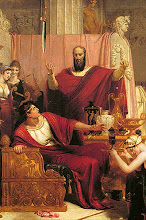Second on the list of unalienable rights is liberty. Liberty ties closely to the first; the right to life, or the right to experience life, the good with the bad. Liberty is understood as being free from arbitrary or despotic control. It is the power of choice, of agency. In order to fully benefit from the experiences of life, we must be free to experience them as is our wont.
For liberty to exist, there must be three conditions met first:
1. The ability to choose
2. A choice between two or more opposing options
3. A consequence as a result of the choice made
The ability to choose- We are all born with the capacity to make informed decisions. That God which gives us life also gives us the ability to weigh, to consider, and to act accordingly, every man according to his circumstances and his knowledge. We are free to choose what path we will take, and to choose whether we will continue down that path or abandon it for another. While all men are subject to various pulls and impulses that his nature imposes upon him, no man is an automaton. We are free to make the choice to heed the call of nature, or or resist it, overcome it, and master it.
A choice- We live in a world of opposition. There is an opposition in all things. Good and bad, better or worse. Every day we are confronted with choices: some minor, some major, some critical, some trivial. This is not to say that all such opposing choices are always diametrically opposed (for example, a choice between a good option and a better one). The concept of choice merely stems from the reality of scarcity, specifically of our time. We are all mortal, and so our time here on earth is limited. The choice to do one thing means an opportunity forgone elsewhere. Time spent working is time not spent with our family. There will always be choices, some more difficult to make than others. Even the decision to not make a choice, is still a choice (between decisiveness, an indecisiveness).
A consequence- Inherent in any choice is a natural consequence induced by the choice. This may be something as simple as the inability to pursue B when we have chosen A (such as when we choose a profession or a mate), or it may be something much more dramatic (such as getting cancer form choosing to smoke six packs a day). While we are free to choose what course of action we will pursue, we are never free to choose the consequences of our actions. This fact seems to be the most troublesome to most people, especially in light of the fact that too often we make bad decisions as the result of imperfect information, or in spite of the best of intentions. The wonderful fact of life, however, is that which does not kill us, truly makes us stronger. While we may suffer for our mistakes (and some us suffer more horribly for the mistakes of others), we learn and we grow from those mistakes. We become more adept at making wise decisions, and reaping the positive consequences therein.
Albeit cliche, the saying "freedom isn't free" is nonetheless true. The natural instincts of man runs between two violent extremes: that of having all his decisions made for him (tyranny), or one where everyone decides for themselves, and only the strong achieve their goals while the weak are left to suffer (anarchy). For liberty to exist, there must be a strict, but fair, legal framework that establishes a set code of acceptable behaviors, and declares certain unalienable rights of man. Civilization cannot exist, until man can reign in his natural instincts, and learn to acquiesce to certain learned morals and traditions that society imposes on him. The cost of liberty then, is the submission of man to certain moral intuitions. It is only when man is virtuous, that he can truly be free.
Another price of liberty is the unending pursuit of truth and wisdom. We all have experienced the harsh lessons of decisions made on imperfect or incomplete information. We must covet truth, no matter its earthly source, or be forever doomed to blindly swat at the choices in front of us in ignorance. ''Truth is the oldest of all the virtues; it antedated man, it lived before there was man to perceive it or to accept it. It is the unchangeable, the constant. Law is the eternal truth of Nature—the unity that always produces identical results under identical conditions. When a man discovers a great truth in Nature he has the key to the understanding of a million phenomena; when he grasps a great truth in morals he has in it the key to his spiritual re-creation......Truth is first, intellectual honesty; the craving to know the right; second, it is moral honesty, the hunger to live the right." (William G. Jordan -The Power of Truth)
A smart man may learn from his own choices, but a wise man can learn from the choices of others.
As all the other rights mentioned in the Declaration of Independence, Liberty is unalienable -it cannot be bought, transferred, sold, taken, or given away. No man can take away my ability to choose, to make a choice, or to reap the consequences. To attempt to do so is to execute a mighty injustice, and incur the wrath of Almighty God. We must be ever vigilant to secure the right to liberty, that we may fully reap the benefits of the right to life.
-Damocles
Friday, August 13, 2010
Subscribe to:
Comments (Atom)
